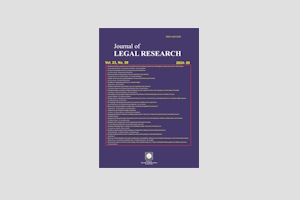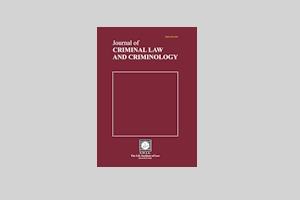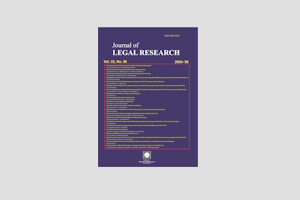Journal of
Criminal Law and Criminology
Number 7
Vol. IV ● No. 1
Spring – Summer 2016
Managing Editor: Vahid Eshtiagh
Editor-in-Chief: Mohammad Ashoori
CONTENTS
Articles
The Analysis of Effects of Imprisonment on Prisoners Based on “Gabriel Tarde’s Imitation Laws”
Mehdi Fazli & Shahin Darabipanah
Remote Testimony (Analysis Article 186 of the Islamic Penal Code)
Abolghasem khodadi (Ph.D.) & Ali Khaledi
Assessing Effectiveness of Testimony Psychology in Scientific Procedure of Tehran City Courts
Mohammad Ashouri (Ph.D.) & Asiye Akbarisharak
Unilateral Sanctions against Iran in the Context of International Criminal Law: Crime against Humanity?
Sayed Ghasem Zamani (Ph.D.) & Hossein Farahi & Aramesh Shahbazi (Ph.D.)
The Concurrence of the International Responsibility of Individual and State for Aggression
Hilda Rezaee & Sadegh Salimi (Ph.D.)
Restorative Aspects of Plea Bargaining in the International Criminal Tribunal for the Former Yugoslavia (ICTY)
Fateme Sadat Ghoreishi & Mahdi Momeni (Ph.D.)
Articles
The Analysis of Effects of Imprisonment on Prisoners Based on “Gabriel Tarde’s Imitation Laws”
Mehdi Fazli
Lecturer of Islamic Azad University, Tehran Shomal Unit
&
Shahin Darabipanah
Responsible Writer, Lecturer of Payame Noor University of Zanjan
Abstract:
Imprisonment as main punishment, has received lots of criticisms in all countries around the world. One of most important critiques on imprisonment is the problem of imitation and learning of crime inside the prison. “Crime Learning” theory first was published in French scholar -“Gabriel Tardes”- works, and led to triplet” Imitation Laws” by him. The main object of this article is to examine the crime learning theory in the light of his imitation laws. Methodology of research is combination of descriptive and field-setting method and instrument of research is researcher-made questionnaire. Justifiability of questionnaire has been confirmed by professors of law and social sciences and its stability has acquired 73% using Cronbach’salpha. Statistical population has been all 130 Iranian Female prisoners in Zanjan, Qom and Arak prisons in 2012. For verification of Tarde’s laws, three hypotheses were extracted based on his triplet laws; these hypotheses then are analyzed using descriptive statistics, “F” analysis and correlation coefficient. Two hypothesizes out of three were proved. In other words, the relation between kind of crime and intercommunications inside the prison was proved; in addition, relationship between kind of crime and being affected by mode of crime was demonstrated; while there was no meaningful relationship between kind of crime and criminal background of prisoners.
Keywords: Imprisonment, Learning, Cognitive Theories, Professional Criminals, Imitation Laws, Gabriel Tarde.
Remote Testimony (Analysis Article 186 of the Islamic Penal Code)
Abolghasem khodady (Ph.D.)
Assistant Professor Faculty member of Law Shahed University
&
Ali khaledi
Master’s Graduate of Private Law of the Shahed University
Abstract:
Remote testimony, to testify if they qualify as a new form of remote testimony and general conditions for the examination of witnesses as proof of criminal and civil proceedings, both civil and commercial, and members of the court proceedings may be considered. For this form of witness testimony as being attributable to positive action, we must appear before the court is impossible and authenticity of remote evidence is established to control general Conditions of witness and testimony as the case may be, because the file is not unique to the testimony of witnesses.
Apart from the specific conditions of remote testimony, prosecutors and the courts have evidence other general conditions as well as conditions to obtain their testimony non-electronic probative value of the testimony so that they can consider the distance to prove the claims. Remote testimony that is divided into two categories: electronic and non-electronic proof in all cases, be subject to criminal and civil proceedings in the case by fulfilling all the conditions will be.
Keywords: Witness, Testimony, Remote Testimony, Electronic Testimony, Audio-Video.
Assessing Effectiveness of Testimony Psychology in Scientific Procedure of Tehran City Courts
Mohammad Ashouri (Ph.D.)
Professor of the University of Tehran\ Islamic Azad Science and Research Branch of Tehran
&
Asiye Akbarisharak
Master of Criminal Law and Criminology,
Islamic Azad University Science and Research Branch of Tehran
Abstract:
The aims of this article is to explain the impact of psychological findings on intuition testimony credibility and assessing scientific procedure of Tehran City courts, in this regard To provide indicators and criteria for assessing ting the testimony credibility.
The main question of this study is that how can psychology findings affect the assessment system of credibility. The method used in this research is library and field method and by means of testimony taking and questionnaire. The study statistical population included all judges in Tehran courts and statistical sample are 30 people from courts judges who were selected using random sampling method. Information collected using descriptive and inferential statistics and parametric or non-parametric tests analyzed by SPSS software. The findings of this study show that using psychology findings, can be reached to reliable indicators to assess testimony credibility. In addition statistical analysis indicates that the judges of Tehran prosecutor’s offices not follow some psychology indicators in assessing intuition testimony credibility.
Keywords: Testimony, Assessment, Testimony Psychology, Witness Credibility.
Unilateral Sanctions against Iran in the context of International Criminal Law: Crime against Humanity?
Sayed Ghasem Zamani (Ph.D.)
Associate Professor, International Law, Allameh Tabataba’i University, Tehran, Iran
&
Hossein Farahi
Ph.D. Student, International Law, Allameh Tabataba’i University, Tehran, Iran
&
Aramesh Shahbazi (Ph.D.)
Assistant Professor, International Law, Allameh Tabataba’i University, Tehran, Iran
Abstract:
Unilateral sanctions include actions taken by some states against the others. These sanctions are sometimes legitimate. However some of the sanctions could not be justified. It has widely been accepted that the obvious violation of fundamental human rights law in result of the unilateral sanctions may be considered as an international wrongful act. Although some believe that given the extensive devastating and inhuman impacts of all-out coercive international sanctions have been imposed unilaterally, can be considered as an international crime against humanity. In this article we will consider the side-effects of unilateral sanctions as crime against humanity by focusing on the unilateral Sanctions imposed by US against Iran.
Keywords: Unilateral Sanctions, Crime against Humanity, Human Rights, Iran, US.
The Concurrence of the International Responsibility of Individual and State for Aggression
Hilda Rezaee
Ph.D. Student of public International Law, Department of public & International law,
College of Law and Political Science, Science and Research Branch,
Islamic Azad University, Tehran, Iran
&
Sadegh Salimi (Ph.D.)
Visiting Professor, Department of Public & International Law,
College of Law and Political Science, Science and Research Branch,
Islamic Azad University, Tehran, Iran
Abstract:
Present study considers the concurrence of individual criminal responsibility and aggravated state responsibility for aggression. To describe this concurrence, both material element and psychological element of the aggression crime and different approaches towards this concurrence have been considered determining the concurrence of material element, is related to the definition on aggression on aggression crime in context of individual and state’s responsibility, as defined by the un general assembly resolution 3314 in 1974 and the adopted at kampala revising conference 2010. The material element of this crime, according to the definition is the plan, initiation and implementing the act of aggression which are four types of participation in a crime. Also, the psychological element in crime of aggression is conscious and known intent; namely, mentioned elements in this crime must be both knowingly and deliberately. Also, in this study, two different viewpoints on ascertaining specific intent of crime commitment have been studied. The goal of the research is to explain the concurrence of the international responsibility of individual and state in aggression to argue that the two items are not two separate categories and rather, they complete each other.
Keywords: The Concurrence of Material Element, The Concurrence of Psychological Element, Aggravated State Responsibility, Individual Criminal Responsibility, Crime of Aggression.
Restorative Aspects of Plea Bargaining in the International Criminal Tribunal for the Former Yugoslavia (ICTY)
Fateme Sadat Ghoreishi
Department of Law, University of Payame Noor
Mahdi Momeni (Ph.D.)
Department of Law, University of Payame Noor
Abstract:
International criminal tribunals which have jurisdiction over crimes of genocide, crimes against humanity and war crimes are facing with many restrictions, including time and budgetary restrictions. Consequently, to speed up case processing, they have recently adopted the methods that were traditionally used by national jurisdictions. Among these methods are guilty plea and plea bargaining. Therefore, with the adoption of the Rule 62-3 of the Procedure and Evidence Rules in December 2001, International Criminal Tribunal for the former Yugoslavia recognized the institution of plea bargaining.
Since the restorative justice discourse has become the common discourse in the criminal justice, in this article besides defining and identifying the institution of plea bargaining, the effects of restorative justice on this institution will be examined in light of some cases of International Criminal Tribunal for the former Yugoslavia
Keywords: Guilty Plea, Plea Bargaining, Restorative Justice, Apology, Truth Telling.





